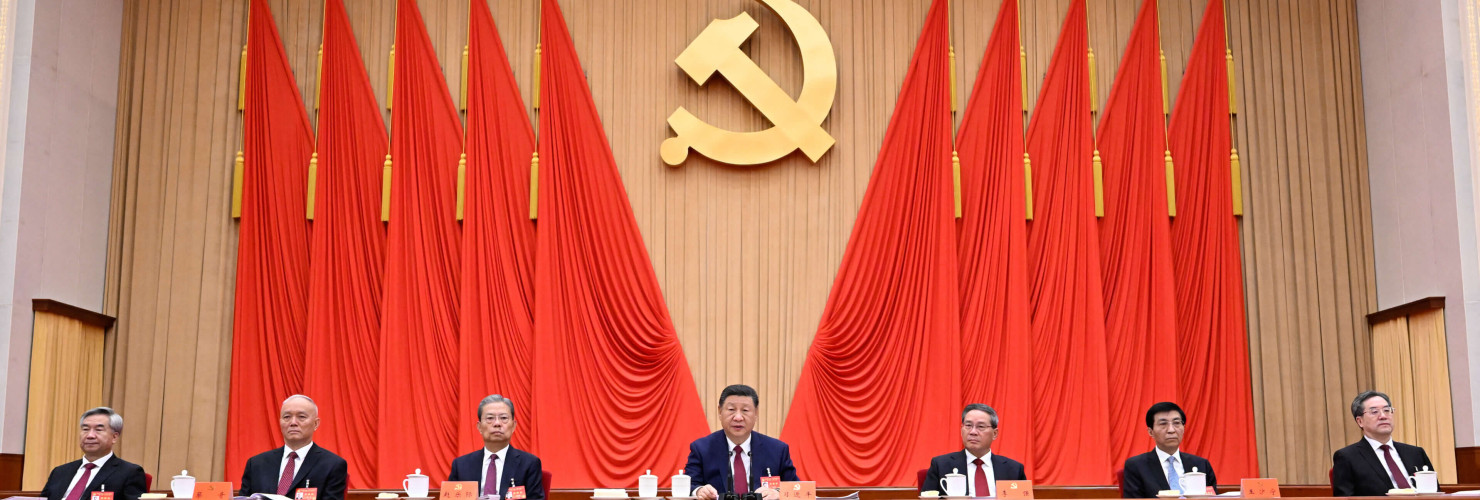

China doubles down on innovation course - Key takeaways from the Fourth Plenum
China is banking on innovation and high-tech development to weatherproof its economy and carry it forward amidst a geopolitical storm. This can be seen from the plans approved at the Fourth Plenary Session of the Central Committee of the Communist Party that just wrapped up with a 2-hour press conference in Beijing.
Katja Drinhausen, Head of Program of the research team "Politics & Society" at MERICS, shares her first assessments on the meeting’s outcomes and the course charted at the Plenum for the next Five-Year Plan (2026-2030):
Looking at the Plenum’s outcomes, what changes can we expect from China’s next Five-Year Plan?
Slight tweaks aside, the priorities and game plan laid out for the upcoming 15th Five-Year Plan are a straight continuation of previous priorities and roadmaps set at the 2024 Third Plenum and in previous National People’s Congress policy plans and outcome documents of key economic meetings like the Central Economic Work Conferences. Xi Jinping and the leadership around him are confident and consistent in their chosen path. The times may be even more turbulent, but the message is to stay the course and improve China’s ability to “struggle”.
So, China’s government will continue to focus on achieving scientific and technological self-reliance and self-strengthening, while goals like improving people's livelihoods and promoting consumption only rank second?
China’s leadership is driven by the belief that it must lead the new wave of technological revolution and industrial transformation – a “historic opportunity” in its own words. Breakthroughs in innovation and talent are essential for the country to pursue such „high-quality development“. However, the focus on developing “new productive forces” – that is, fostering strategic emerging and future industries like clean energy or AI – does not mean abandoning the old ones. There are repeated demands to uphold the “real economy” and update traditional manufacturing and industries – no doubt with an eye on employment and preventing dependencies if these industries were to fall away.
The Plenum communique echoes previous calls for boosting domestic demand and consumption and proposes a range of measures for domestic rebalancing. This includes improving the unified national market and promoting less developed urban and rural areas. Beijing talks about creating virtuous circles between improving people's livelihoods and promoting consumption. But the whole mantra of “new demand will lead new supply, and new supply will create new demand” to create a reliable baseline of domestic circulation rings a bit hollow, considering that that social welfare and employment seemed more like an afterthought in the initial communique.
The plenum highlighted the ongoing anti-corruption campaign and personnel decisions. Nine PLA officials were confirmed to have lost their jobs and party positions, including He Weidong, a vice-chair of the Central Military Commission. He has now been replaced by Zhang Shengmin, the military’s anti-corruption chief and allegedly a loyal supporter of Xi. What do these decisions tell us about Xi’s grip on power?
No matter what expectations and political conventions demand: Xi does not seem to feel pressured to fill the empty positions in the Central Committee and military ranks, unless he has people in mind he deems loyal enough. He still sees the military as a breeding ground for corruption and plans to run a right ship with his right-hand man Zhang Youxia. With just three members plus Xi himself, the downsized Central Military Commission may now be better to control – but also significantly understaffed compared to its previous set-up of up to 10 or more members.
Xi can assume that he sits firmly in the saddle: The plenum celebrated the work of the 14th Five-Year Plan and achievements of Xi’s third term in office. The Plenum communique also suggests that the political purges in the name of anticorruption are far from over. "To run the country well, we must first run the party well; only a party that is thriving can make our country strong" is the motto.
What do the outcomes of the Fourth Plenum tell us about China's relationship with the rest of the world, also in view of the geopolitical tensions, especially with the US?
Beijing speaks of its ambitions in pursuing high-level opening-up and tries to cast itself as a defender of multilateral trade. But the main thrust of the plenum makes clear that the party leadership is preparing for a protracted geopolitical struggle. The repeated calls to rally around the party and struggle for the overall mission of national progress indicate that international cooperation will be pursued on the CCP’s terms.
The Plenum’s emphasis on self-reliance in science and technology is a reminder that the leadership is systematically pursuing the elimination of supply chain vulnerabilities. China is reducing as many dependencies on foreign actors as it can, all the while increasing the dependencies of other countries on itself. This year, China’s ability to use such dependencies as leverage, as it has done with rare earths, has become abundantly clear. For Germany and other European member states this means that competition and security will feature more prominently in engagement on trade, technology and innovation.
How should Europe then brace itself for cooperation offers “on the CCP’s terms”?
The successes of industrial policy programs such as Made in China 2025 have shown that European countries and industry leaders in the private sector must take Beijing’s efforts in self-reliance and technological leadership seriously. China’s goal to strengthen its industrial base and lead the technologies of the future comes at a cost to other countries looking to hold onto existing or create new manufacturing sectors. Europe can promote itself as an attractive partner for emerging economies, by deepening trade ties and supporting the growth of their industrial sectors.
MERICS experts Alexander Brown and Alexander Davey contributed to this MERICS Insight.
For media requests, please reach out to [email protected].
Pressekontakt
Die Expert:innen vom Mercator Institute for China Studies beantworten gern Ihre Anfragen rund um das Thema China.
